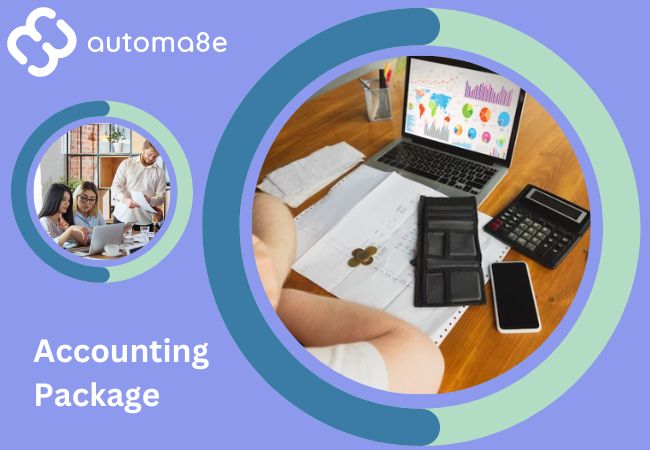In today’s fast-paced business world, choosing the right accounting package can be a game-changer for your company’s financial health and efficiency. With a plethora of options available, it’s crucial to make an informed choice that aligns with your specific business needs. In this article, we’ll explore the key factors to consider and provide valuable insights to help you navigate this important decision.
In this blog, we’ll explore:
- How to Choose the Right Accounting Package?
- Understanding Your Business Needs
- Budget Considerations
- User-Friendly Interface
- And More………………………
How to Choose the Right Accounting Package?
1. Understanding Your Business Needs
To select the perfect accounting package, you must first understand your business’s unique requirements. Start by assessing the size of your business, your industry, and your future growth prospects.
2. Budget Considerations
Budget plays a significant role in your decision-making process. Determine how much you’re willing to invest in accounting software, keeping in mind that the right package can lead to cost savings in the long run.
3. Scalability
Opt for an accounting package that can grow with your business. Scalability ensures that your software remains relevant as your company expands.
4. User-Friendly Interface
A user-friendly interface is essential to ensure that your team can easily adapt to the new software. User training can be costly, so choose a package that minimizes the learning curve.
5. Integration Capabilities
Consider whether the accounting package integrates seamlessly with your existing software and tools. Integration can streamline your financial processes and improve overall efficiency.
6. Cloud-Based vs. On-Premises
Decide whether you prefer a cloud-based or on-premises accounting solution. Cloud-based options offer flexibility and accessibility, while on-premises solutions provide more control over your data.
7. Reporting and Analytics
Robust reporting and analytics features are invaluable for making data-driven decisions. Ensure that the accounting package provides the necessary reporting tools for your business.
8. Compliance and Security
Your chosen software must comply with all relevant accounting standards and regulations. Additionally, prioritize security features to protect your sensitive financial data.
9. Customer Support
Evaluate the level of customer support offered by the software provider. Quick and effective support can be a lifesaver in case of any issues or questions.
10. Customization Options
Every business has unique needs. Look for software that allows customization to tailor it to your specific requirements.
11. User Reviews and Recommendations
Before deciding, read user reviews and seek recommendations from peers in your industry. Real-world experiences can provide valuable insights.
12. Trial Period
Many accounting software providers offer trial periods. Take advantage of these to test the software’s suitability for your business before committing.
13. Mobile Accessibility
In today’s mobile-driven world, having access to your accounting data on the go can be a game-changer. Ensure that the software offers mobile compatibility.
14. Data Backup and Recovery
Data loss can be catastrophic. Verify that the accounting package includes robust backup and recovery options to safeguard your financial information.
15. Vendor Reputation
Consider the reputation and track record of the software vendor. A reputable vendor is more likely to provide quality products and support.
16. Training and Resources
Check if the software provider offers training resources, tutorials, or online communities to help you make the most of their product.
17. Future Updates and Support
Ensure that the software receives regular updates and ongoing support to address evolving business needs.
18. User Permissions and Access Control
For security and confidentiality, the software should allow you to control user permissions and restrict access to sensitive financial data.
19. Data Migration
If you’re transitioning from an existing accounting system, inquire about data migration services to ensure a smooth transition.
20. Industry-Specific Features
Depending on your industry, you may require specific features or integrations. Choose software that caters to your industry’s needs.
21. Trial Balance and Reconciliation
Efficient trial balance and reconciliation processes are essential for accurate financial reporting.
22. Tax Compliance
Ensure that the accounting package assists with tax compliance, including tax calculations, reporting, and filings.
23. Multi-Currency Support
If your business deals with multiple currencies, choose software that offers robust multi-currency support.
24. Ease of Updates and Maintenance
Regular updates and maintenance should be hassle-free to minimize downtime and disruptions.
25. User Training and Onboarding
Invest in user training and onboarding to ensure that your team can fully leverage the chosen accounting package’s capabilities.
Now that we’ve covered the essential factors to consider, it’s time to take action. Evaluate your options carefully, request demos, and seek expert advice if needed. The right accounting package can revolutionize your financial management, leading to increased efficiency and profitability.
Frequently Asked Questions (FAQs)
A: Yes, it’s possible to switch, but it can be challenging and time-consuming. It’s best to choose the right package from the start.
A: Cloud-based software is hosted online, offering accessibility from anywhere. On-premises software is installed locally on your servers, providing more control but less accessibility.
A: Choose a reputable provider with strong security measures, including data encryption and regular security audits.
A: Focus on tailoring it to your specific needs, such as creating custom reports, adding unique fields, and setting user permissions.
A: Yes, some free accounting software exists, but they often have limitations. Consider your business needs before opting for a free solution.
A: Many accounting packages offer integrations with e-commerce platforms. Check compatibility and available integrations with your chosen platform.
Conclusion
Choosing the right accounting package is a critical decision for your business’s financial health and success. By carefully considering the factors outlined in this guide and conducting thorough research, you’ll be well-equipped to make an informed choice. Remember that the right accounting package can streamline your financial processes, improve accuracy, and set the stage for growth. Make your decision wisely, and your business will reap the benefits for years to come.
